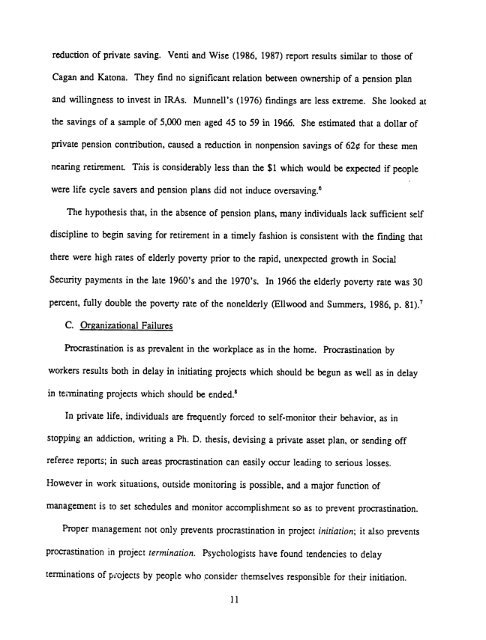INSTITUTE FOR
INSTITUTE FOR
INSTITUTE FOR
Create successful ePaper yourself
Turn your PDF publications into a flip-book with our unique Google optimized e-Paper software.
eduction of private saving. Venti and Wise (1986, 1987) report results similar to those of<br />
Cagan and Katona. They find no significant relation between ownership of a pension plan<br />
and willingness to invest in IRAs. Munnell's (1976) findings are less extreme. She looked at<br />
the savings of a sample of 5,000 men aged 45 to 59 in 1966. She estimated that a dollar of<br />
private pension contribution, caused a reduction in nonpension savings of 62¢ for these men<br />
nearing retirement. This is considerably less than the $1 which would be expected if people<br />
were life cycle savers and pension plans did not induce oversaving. 6<br />
The hypothesis that, in the absence of pension plans, many individuals lack sufficient self<br />
discipline to begin saving for retirement in a timely fashion is consistent with the finding that<br />
there were high rates of elderly poverty prior to the rapid, unexpected growth in Social<br />
Security payments in the late 1960's and the 1970's. In 1966 the elderly poverty rate was 30<br />
percent, fully double the poverty rate of the nonelderly (Ellwood and Summers, 1986, p. 81). 7<br />
C. Organizational Failures<br />
Procrastination is as prevalent in the workplace as in the home. Procrastination by<br />
workers results both in delay in initiating projects which should be begun as well as in delay<br />
in terminating projects which should be ended. 8<br />
In private life, individuals are frequently forced to self-monitor their behavior, as in<br />
stopping an addiction, writing a Ph. D. thesis, devising a private asset plan, or sending off<br />
referee reports; in such areas procrastination can easily occur leading to serious losses.<br />
However in work situations, outside monitoring is possible, and a major function of<br />
management is to set schedules and monitor accomplishment so as to prevent procrastination.<br />
Proper management not only prevents procrastination in project initiation; it also prevents<br />
procrastination in project termination. Psychologists have found tendencies to delay<br />
terminations of projects by people who consider themselves responsible for their initiation.<br />
11
















